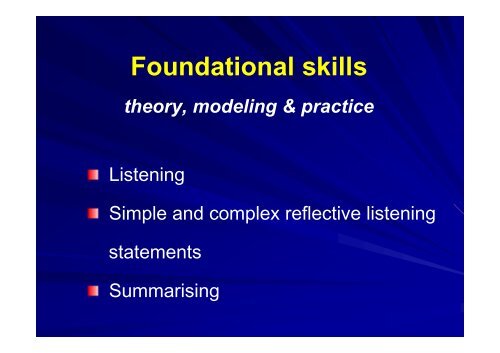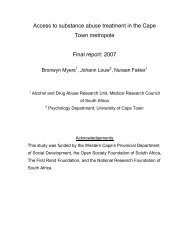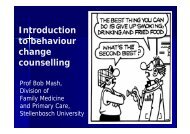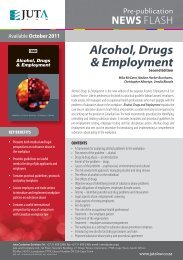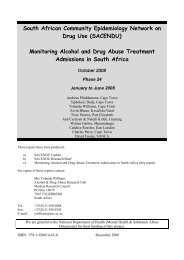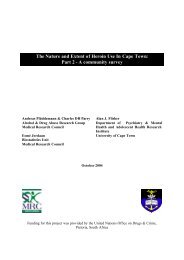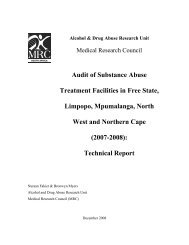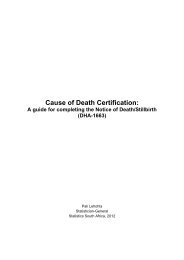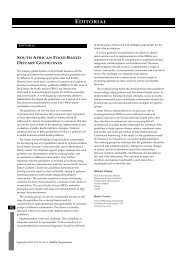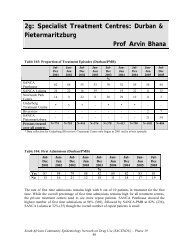Foundational skills
Foundational skills
Foundational skills
- No tags were found...
Create successful ePaper yourself
Turn your PDF publications into a flip-book with our unique Google optimized e-Paper software.
<strong>Foundational</strong> <strong>skills</strong><br />
theory, modeling & practice<br />
Listening<br />
Simple and complex reflective listening<br />
statements<br />
Summarising
Key tasks in consultations about behaviour change<br />
(Road map)<br />
Establish rapport<br />
(room set; pts expectations; permission; a typical day)<br />
Exchange Information<br />
Set agenda<br />
(ask permission; agenda setting)<br />
Multiple behaviours<br />
(Pt selects)<br />
Single behaviour<br />
(reflective listening; stage; information exchange; reducing resistance)<br />
Assess readiness to change:<br />
importance & confidence<br />
Reduce resistance<br />
Explore importance<br />
Build confidence<br />
Problem solve
Definition<br />
(Revised)<br />
Motivational interviewing is a person-centered,<br />
goal-oriented method of communication for<br />
eliciting and strengthening intrinsic motivation<br />
for positive change.<br />
Miller & Rollnick 2008. Ten Things that Motivational Interviewing Is Not, in press with Behavioural and Cognitive Psychotherapy
3 Communication Styles<br />
Following<br />
Guiding<br />
Directing
3 basic communication <strong>skills</strong><br />
Listening<br />
Asking<br />
Informing
Contrasting Styles of Conversation<br />
Answer<br />
<br />
Contracted<br />
Answer<br />
This is<br />
beginning to<br />
feel like an<br />
interrogation<br />
Closed<br />
Question<br />
Another<br />
Question
Contrasting Styles of Conversation<br />
I m following<br />
I m following<br />
reluctantly<br />
I know<br />
what you re<br />
trying to make<br />
me say.<br />
I m leading<br />
I m leading<br />
again
Contrasting Styles of Conversation<br />
Expansive<br />
Answer<br />
Thoughtful<br />
Elaborating<br />
Response<br />
This feels<br />
like I m<br />
being<br />
understood<br />
Open<br />
Question<br />
Reflections<br />
& Questions
4 Guiding Principles (R.U.L.E)<br />
Resist the Righting Reflex<br />
Understand patients motivations<br />
Listen to your patient<br />
Empower your patient
Importance of listening in MI<br />
The guiding process of listening helps the person to<br />
keep talking and moving toward change.<br />
• You help the person keep thinking about and exploring<br />
the reasons …… for change…<br />
• When you reflect something that a person has said,<br />
you express interest in it and invite the person to say<br />
more about it ….<br />
• When you reflect their own change talk they hear you<br />
saying again …….. what they themselves have said,<br />
and they explore it further.
Shaping Reflective Listening<br />
Exploring Non-verbal, Passive Listening Skills: select a partner.<br />
One speaks while the other listens. The speaker talks for 5 minutes on a topic<br />
chosen from this list:<br />
How I’ve changed in the last decade.<br />
What I hope to do over the next few<br />
years.<br />
What it was like growing up in my home.<br />
My employment history.<br />
What I like about my best friend.<br />
The things I’m most concerned about.<br />
The listener says nothing at all. Instead, may only communicate<br />
listening, interest and understanding using non-verbal <strong>skills</strong>.
Reflective Listening<br />
Is that what you mean<br />
Most important & most challenging skill.<br />
Involves keeping quiet and listening. Crucial element is how you<br />
respond.<br />
Statements of understanding.<br />
A guess as to what the speaker means rather than assuming you<br />
know. Voiced in a statement<br />
Rather than echoing the client, a skilled reflection continues the<br />
paragraph.<br />
They often begin with, “so you…”, “you feel…”, “you’re wondering if”,<br />
“you….”
MI Skills/Techniques<br />
“OARS”<br />
Used to help people explore their ambivalence and<br />
clarify reasons for change. They support the goal of<br />
encouraging client speech or ‘Change Talk’ - i.e.<br />
talk that favours change.<br />
Open-ended Questions<br />
Affirmations<br />
Reflections<br />
Summarising
Reflective Listening Statements<br />
Do you think your partner understands how depressed you ve been feeling<br />
lately<br />
A question requires an answer.<br />
An incomplete component.<br />
It seems that your partner doesn t appreciate how depressed you ve been<br />
feeling lately.<br />
A statement invites a response.<br />
A complete component.<br />
Its active listening, that demonstrates accurate understanding.
Reflective Listening Statements: An example dialogue<br />
One thing about myself I would like to change is my moodiness.<br />
You never know if you re going to be up or down.<br />
No, it’s not that. I can tell how I m going to feel. It’s just that I overreact to things.<br />
Even little things can upset you.<br />
Sometimes, yes. I think I worry too much.<br />
You sit and fret about things too much.<br />
Yes. Often there is nothing I can do about it, but still I go over and over it in my mind.<br />
And that gets you moody.<br />
Absolutely! I get myself worked up and I can’t sleep.<br />
Even at night you re worrying.<br />
Yes, thats right. That is what I want to change.<br />
The speaker is accurately identifying the problem; not the listener.
Demonstrating Accurate Understanding<br />
Questions : Reflections<br />
3:1 - Good<br />
2:1 - Better<br />
1:1 - Best<br />
Empathic Reflection is the curious and sensitive exploration<br />
of meaning.
Forming Reflections:<br />
Some useful statement openers<br />
So, you feel ...<br />
It sounds like you ...<br />
You re wondering if ...<br />
It seems like you ...<br />
You re thinking, perhaps, that ...<br />
Empathic Reflection: the curious and sensitive exploration of meaning.
Shaping Reflective Listening<br />
Thinking Reflectively. Groups of 3 or 4.<br />
In turn, each person completes this sentence, One thing I like about<br />
myself is .... The others respond with: Do you mean that you ... The<br />
speaker may only respond with, Yes. or No. Elaboration is not allowed.<br />
When the topic is fully explored, swap round. Everyone should have a turn<br />
as speaker. Please don t stop to discuss - we ll do that afterwards.<br />
15 minutes of curious enquiry!
Batting practice<br />
Forming reflections on your feet<br />
In groups of 4 or 5 and form a “batting cage”<br />
One person at a time takes turn as a batter –<br />
Any group member makes a “pitch” and the<br />
batter takes a swing at it. i.e. the group members<br />
throw out specific client statements to which the<br />
batter responds with a short, simple reflection.<br />
Each “batter” in the group responds to 4-5<br />
different statements from the group<br />
Once 1 person is finished as the batter, swop to<br />
the next person in the group. Everyone must<br />
play the batter.
Active Listening using Reflection<br />
In groups of 3 or 4. Each person think of something about yourself that you would like<br />
to change - pick something you feel comfortable discussing.<br />
Start with one as speaker, completing this sentence, One thing about myself that I d like<br />
to change is......<br />
The others act as listeners and respond only with reflective listening statements. Try not<br />
to ask questions. The speaker responds in turn and may elaborate. The goal is to<br />
understand the dilemma, not to find a solution. When the subject is explored, change<br />
around.<br />
Twenty minutes of thoughtful reflection!
Some Suggestions:<br />
Be curious rather than intrusive.<br />
Try to be impartial as to the outcome.<br />
Demonstrate accurate understanding through reflection & summary.<br />
Use open questions that provide elaboration.<br />
Seek permission to ask questions and give advice.<br />
Maintain focus & direction.<br />
Find the potential for change through understanding ambivalence.
Some questions to ask<br />
yourself when in<br />
conversation ...<br />
Quality, not quantity!<br />
What am I doing<br />
Where are we going, and who ’s<br />
deciding<br />
What am I saying, and to<br />
what end<br />
Am I actively listening<br />
Are we dancing or wrestling
“OARS”<br />
Open-ended Questions<br />
Affirmations<br />
Reflections<br />
Summarising
Summarising<br />
Periodic summaries which reinforce what has<br />
been said.<br />
Demonstrates that the client has been listened to.<br />
Prepares client to elaborate further. It’s useful to<br />
end them with “…and what else”
Summarising<br />
Return to listening exercise:<br />
• Each take a turn to summarise what was<br />
heard and to receive feedback from the<br />
speaker<br />
• Comment on how it felt to be heard
Briefly review of session<br />
What was learned<br />
What are the likely challenges in your setting<br />
How may you overcome these


